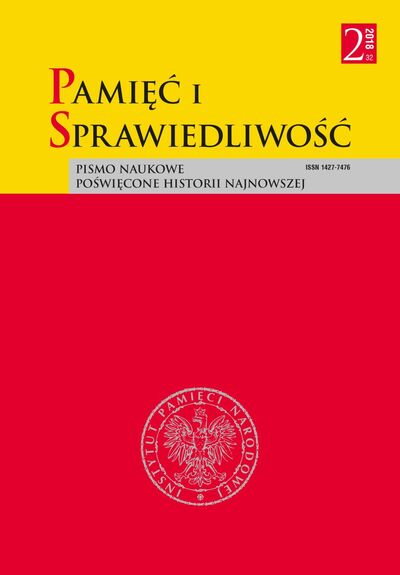The Communist Party of the United States of America since 1919
Pamięć i Sprawiedliwość, V. 32 N. 2 (2018), pages: 15-26
Publication date: 2018-12-30
Abstract
Riferimenti bibliografici
Brown M.E., Randy M., Rosengarten F., Snedeker G., eds., New Studies in the Politics and Culture of U. S. Communism (New York, 1993).
Chambers W., Witness (New York, 1952).
Draper T., American Communism and Soviet Russia: The Formative Period (New York, 1960).
Draper T., The Roots of American Communism (New York, 1957).
Haynes J.E., Klehr H., In Denial: Historians, Communism, and Espionage (San Francisco, 2003).
Haynes J.E., Klehr H., Venona: Decoding Soviet Espionage in America (New Haven, 1999).
Haynes J.E., Klehr H., Vassiliev A., Spies: The Rise and Fall of the KGB in America (New Haven, 2010).
Kelly R.D.G., Hammer and Hoe: Alabama Communists during the Great Depression (Chapel Hill, 1990).
Klehr H., Haynes J.E., Anderson K.M., The Soviet World of American Communism (New Haven, 1998).
Klehr H., Haynes J.E., Firsov F.I., The Secret World of American Communism (New Haven, 1995).
Ottanelli F., The Communist Party of the United States from the Depression to World War II (New Brunswick, N.J., 1991).
Powers R.G., Not Without Honor: The History of American Anti-Communism (New Haven, 1998).
Romerstein H., Breindel E., The Venona Secrets: The Definitive Expose of Soviet Espionage in America (Chicago, 2000).
Taylor G.S., The History of the North Carolina Communist Party (Columbia, 2009).
Zake I., ed., Anti-Communist Minorities in the U.S.: Political Activism of Ethnic Refugees (New York, 2009).
 Język Polski
Język Polski
 English
English
 Deutsch
Deutsch
 Français (France)
Français (France)
 Italiano
Italiano
 Русский
Русский


 PDF (English)
PDF (English)
